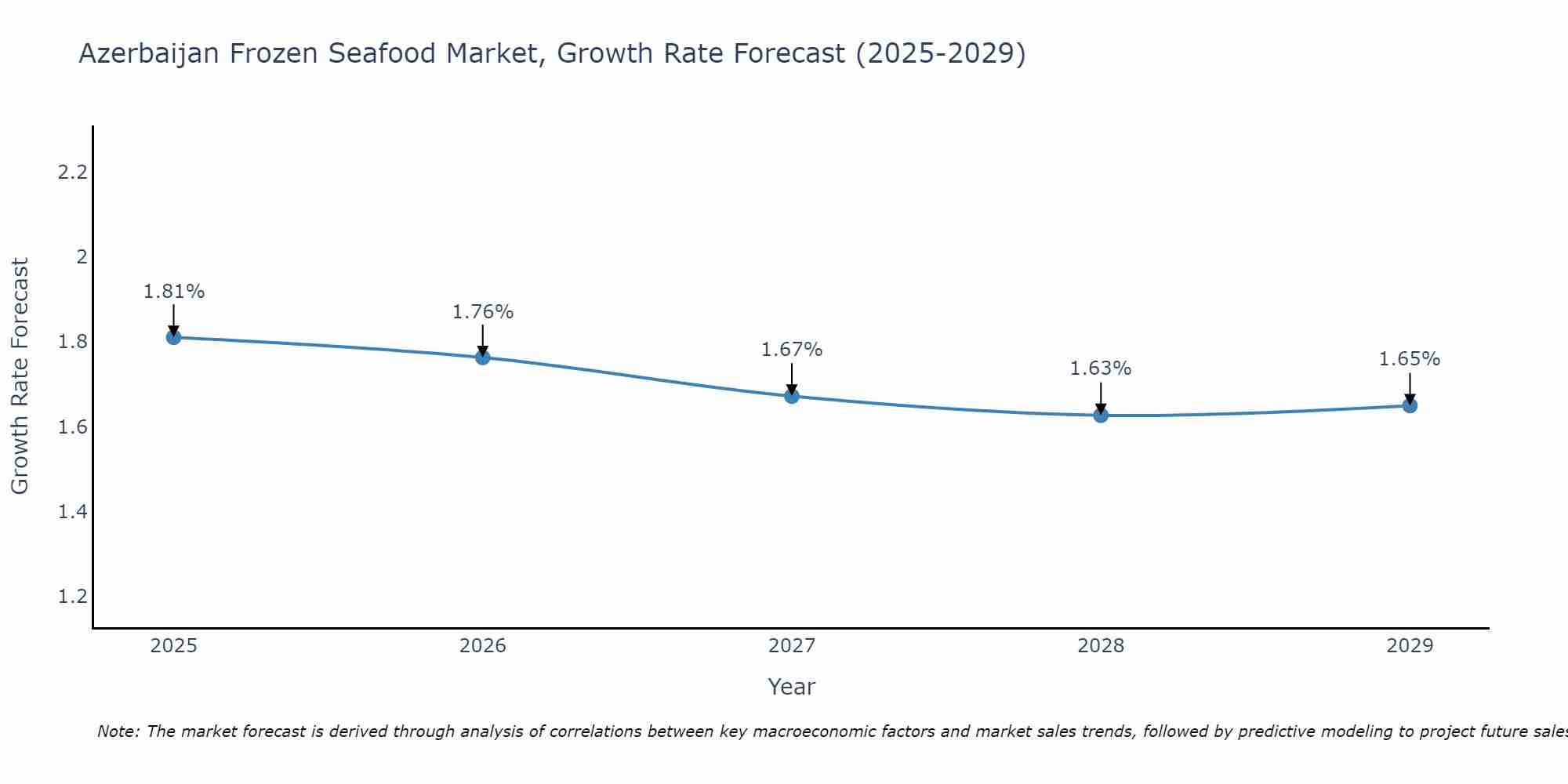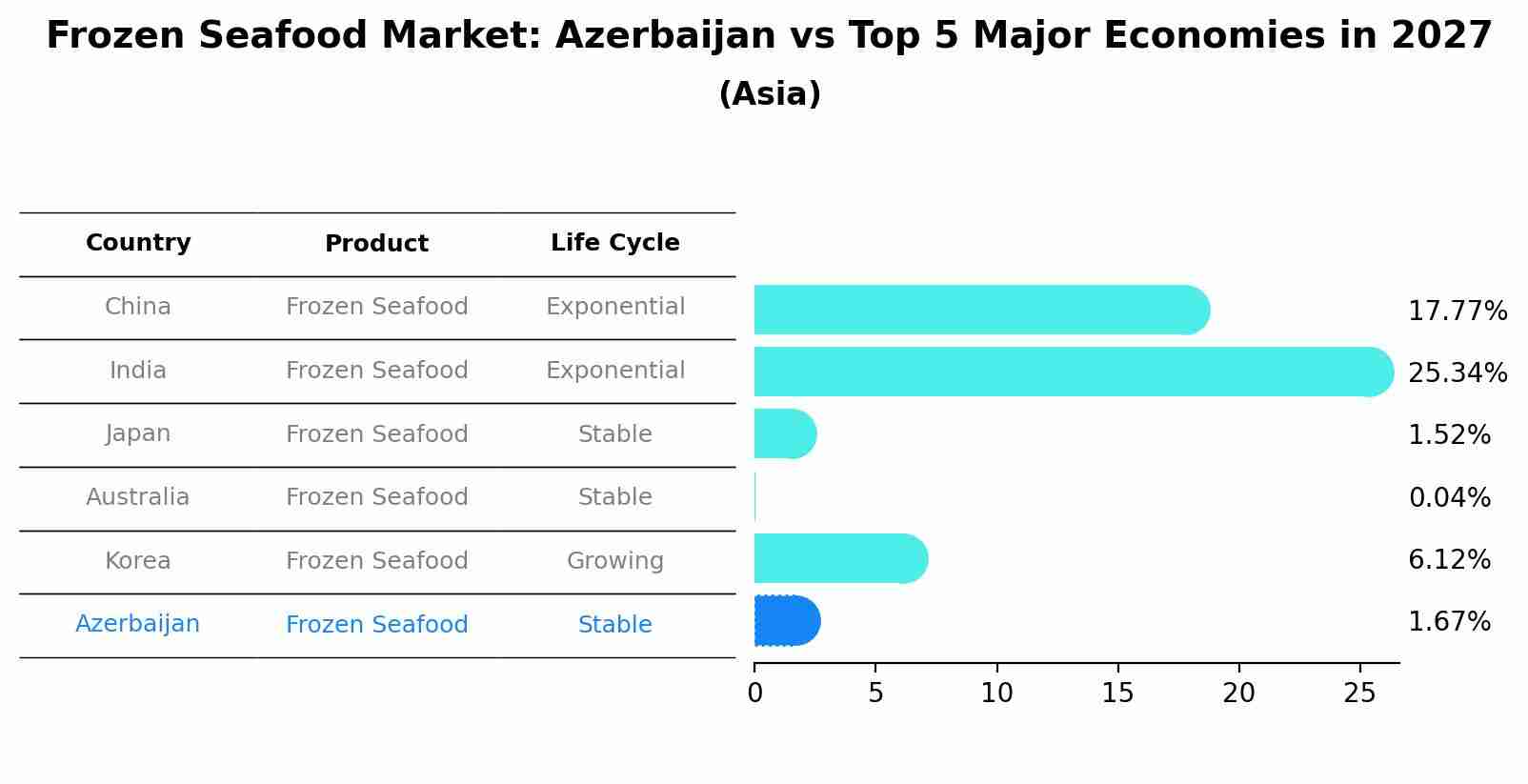Azerbaijan Frozen Seafood Market (2025-2031) Outlook | Revenue, Forecast, Companies, Trends, Analysis, Share, Growth, Industry, Value & Size
| Product Code: ETC386697 | Publication Date: Aug 2022 | Updated Date: Jul 2025 | Product Type: Market Research Report | |
| Publisher: 6Wresearch | Author: Vasudha | No. of Pages: 75 | No. of Figures: 35 | No. of Tables: 20 |
Azerbaijan Frozen Seafood Market Size Growth Rate
The Azerbaijan Frozen Seafood Market is projected to witness mixed growth rate patterns during 2025 to 2029. Starting high at 1.81% in 2025, the market steadily declines to 1.65% by 2029.

Frozen Seafood Market: Azerbaijan vs Top 5 Major Economies in 2027 (Asia)
By 2027, Azerbaijan's Frozen Seafood market is forecasted to achieve a stable growth rate of 1.67%, with China leading the Asia region, followed by India, Japan, Australia and South Korea.

Azerbaijan Frozen Seafood Market Synopsis
The Azerbaijan Frozen Seafood Market is experiencing steady growth driven by increasing consumer demand for convenient and high-quality seafood products. The market offers a wide range of frozen seafood options including fish, shrimp, and squid sourced from both domestic and international suppliers. Factors such as changing dietary preferences, busy lifestyles, and a growing awareness of the health benefits of seafood are contributing to the market`s expansion. Key players in the market focus on product innovation, quality assurance, and sustainable sourcing practices to meet consumer expectations. Despite facing challenges related to logistics and distribution, the Azerbaijan Frozen Seafood Market is expected to continue its growth trajectory, presenting opportunities for both local and international seafood suppliers to capitalize on the market`s potential.
Azerbaijan Frozen Seafood Market Trends
The Azerbaijan Frozen Seafood Market is experiencing a growing demand for convenience and variety in seafood products. Consumers are increasingly seeking ready-to-eat frozen seafood options that offer both quality and convenience. There is also a rising interest in sustainable and responsibly sourced seafood products among consumers. Additionally, the market is witnessing an increase in the availability of a diverse range of frozen seafood products, including shrimp, fish fillets, crab, and calamari. With the convenience of frozen seafood products becoming more popular among busy consumers, retailers and seafood suppliers in Azerbaijan are focusing on expanding their product offerings and ensuring high quality standards to cater to the evolving preferences of the market.
Azerbaijan Frozen Seafood Market Challenges
In the Azerbaijan Frozen Seafood Market, there are several challenges that impact the industry. One major challenge is the lack of cold chain infrastructure and storage facilities, which affects the quality and shelf life of frozen seafood products. Additionally, fluctuations in seafood supply due to environmental factors and overfishing can lead to inconsistent availability and pricing. Furthermore, strict regulations and import/export requirements can create barriers for seafood companies looking to enter or expand in the market. Competition from alternative protein sources and changing consumer preferences towards fresh seafood also pose challenges for frozen seafood producers in Azerbaijan. Overall, addressing these challenges through investments in infrastructure, sustainable sourcing practices, and market education will be crucial for the growth and development of the frozen seafood industry in Azerbaijan.
Azerbaijan Frozen Seafood Market Investment Opportunities
The Azerbaijan Frozen Seafood Market presents promising investment opportunities due to increasing consumer demand for convenient and healthy food options. With a growing middle class and rising disposable incomes, there is a growing interest in seafood products. Investors can consider opportunities in establishing processing facilities, distribution channels, and retail outlets specializing in frozen seafood products. Additionally, investing in technology and infrastructure to improve cold chain logistics and storage facilities can enhance the efficiency of the supply chain. Collaborating with local fishermen and suppliers to ensure a sustainable and reliable source of high-quality seafood can also be a strategic investment approach in tapping into the potential of the Azerbaijan Frozen Seafood Market.
Jordan Agar Market Government Policies
Government policies related to the Azerbaijan Frozen Seafood Market primarily focus on promoting sustainable fishing practices, ensuring food safety standards, and enhancing export opportunities. The State Agency for Fisheries regulates the fishing industry to prevent overfishing and protect marine resources. Additionally, the government enforces strict quality control measures to maintain the safety and integrity of frozen seafood products. In order to boost exports, Azerbaijan has established trade agreements with various countries, providing opportunities for market expansion and increased international competitiveness. Overall, government policies in Azerbaijan aim to support the growth of the frozen seafood market by fostering a conducive regulatory environment and promoting sustainable practices to meet both domestic and international demand.
Azerbaijan Frozen Seafood Market Future Outlook
The future outlook for the Azerbaijan Frozen Seafood Market appears promising, driven by factors such as increasing consumer demand for convenient and healthy food options, technological advancements in seafood processing and preservation, and growing awareness about the benefits of consuming seafood. With a focus on sustainability and quality, key players in the market are likely to invest in modern freezing techniques and storage facilities to ensure the freshness and nutritional value of frozen seafood products. Additionally, the rising popularity of seafood in Azerbaijani cuisine and the expanding distribution channels, including supermarkets and online platforms, are expected to further boost market growth in the coming years, presenting opportunities for both domestic producers and international suppliers to capitalize on this evolving market trend.
Key Highlights of the Report:
- Azerbaijan Frozen Seafood Market Outlook
- Market Size of Azerbaijan Frozen Seafood Market, 2024
- Forecast of Azerbaijan Frozen Seafood Market, 2031
- Historical Data and Forecast of Azerbaijan Frozen Seafood Revenues & Volume for the Period 2021 - 2031
- Azerbaijan Frozen Seafood Market Trend Evolution
- Azerbaijan Frozen Seafood Market Drivers and Challenges
- Azerbaijan Frozen Seafood Price Trends
- Azerbaijan Frozen Seafood Porter's Five Forces
- Azerbaijan Frozen Seafood Industry Life Cycle
- Historical Data and Forecast of Azerbaijan Frozen Seafood Market Revenues & Volume By Nature for the Period 2021 - 2031
- Historical Data and Forecast of Azerbaijan Frozen Seafood Market Revenues & Volume By Organic Frozen Seafood for the Period 2021 - 2031
- Historical Data and Forecast of Azerbaijan Frozen Seafood Market Revenues & Volume By Conventional Frozen Seafood for the Period 2021 - 2031
- Historical Data and Forecast of Azerbaijan Frozen Seafood Market Revenues & Volume By Form for the Period 2021 - 2031
- Historical Data and Forecast of Azerbaijan Frozen Seafood Market Revenues & Volume By Raw Frozen Seafood for the Period 2021 - 2031
- Historical Data and Forecast of Azerbaijan Frozen Seafood Market Revenues & Volume By Processed Frozen Seafood for the Period 2021 - 2031
- Historical Data and Forecast of Azerbaijan Frozen Seafood Market Revenues & Volume By End Use for the Period 2021 - 2031
- Historical Data and Forecast of Azerbaijan Frozen Seafood Market Revenues & Volume By Food Processing Industry for the Period 2021 - 2031
- Historical Data and Forecast of Azerbaijan Frozen Seafood Market Revenues & Volume By Food Service Industry for the Period 2021 - 2031
- Historical Data and Forecast of Azerbaijan Frozen Seafood Market Revenues & Volume By Retail/Household for the Period 2021 - 2031
- Historical Data and Forecast of Azerbaijan Frozen Seafood Market Revenues & Volume By Product Type for the Period 2021 - 2031
- Historical Data and Forecast of Azerbaijan Frozen Seafood Market Revenues & Volume By Frozen Fish for the Period 2021 - 2031
- Historical Data and Forecast of Azerbaijan Frozen Seafood Market Revenues & Volume By Frozen Molluscs for the Period 2021 - 2031
- Historical Data and Forecast of Azerbaijan Frozen Seafood Market Revenues & Volume By Frozen Crustaceans for the Period 2021 - 2031
- Historical Data and Forecast of Azerbaijan Frozen Seafood Market Revenues & Volume By Distribution Channel for the Period 2021 - 2031
- Historical Data and Forecast of Azerbaijan Frozen Seafood Market Revenues & Volume By Business to Business for the Period 2021 - 2031
- Historical Data and Forecast of Azerbaijan Frozen Seafood Market Revenues & Volume By Business to Consumer for the Period 2021 - 2031
- Historical Data and Forecast of Azerbaijan Frozen Seafood Market Revenues & Volume By E-Commerce/Online Stores for the Period 2021 - 2031
- Azerbaijan Frozen Seafood Import Export Trade Statistics
- Market Opportunity Assessment By Nature
- Market Opportunity Assessment By Form
- Market Opportunity Assessment By End Use
- Market Opportunity Assessment By Product Type
- Market Opportunity Assessment By Distribution Channel
- Azerbaijan Frozen Seafood Top Companies Market Share
- Azerbaijan Frozen Seafood Competitive Benchmarking By Technical and Operational Parameters
- Azerbaijan Frozen Seafood Company Profiles
- Azerbaijan Frozen Seafood Key Strategic Recommendations
Frequently Asked Questions About the Market Study (FAQs):
- Single User License$ 1,995
- Department License$ 2,400
- Site License$ 3,120
- Global License$ 3,795
Search
Thought Leadership and Analyst Meet
Our Clients
Related Reports
- Canada Oil and Gas Market (2026-2032) | Share, Segmentation, Value, Industry, Trends, Forecast, Analysis, Size & Revenue, Growth, Competitive Landscape, Outlook, Companies
- Germany Breakfast Food Market (2026-2032) | Industry, Share, Growth, Size, Companies, Value, Analysis, Revenue, Trends, Forecast & Outlook
- Australia Briquette Market (2025-2031) | Growth, Size, Revenue, Forecast, Analysis, Trends, Value, Share, Industry & Companies
- Vietnam System Integrator Market (2025-2031) | Size, Companies, Analysis, Industry, Value, Forecast, Growth, Trends, Revenue & Share
- ASEAN and Thailand Brain Health Supplements Market (2025-2031) | Strategy, Consumer Insights, Analysis, Investment Trends, Opportunities, Growth, Size, Share, Industry, Revenue, Segments, Value, Segmentation, Supply, Forecast, Restraints, Outlook, Competition, Drivers, Trends, Demand, Pricing Analysis, Competitive, Strategic Insights, Companies, Challenges
- ASEAN Bearings Market (2025-2031) | Strategy, Consumer Insights, Analysis, Investment Trends, Opportunities, Growth, Size, Share, Industry, Revenue, Segments, Value, Segmentation, Supply, Forecast, Restraints, Outlook, Competition, Drivers, Trends, Demand, Pricing Analysis, Competitive, Strategic Insights, Companies, Challenges
- Europe Flooring Market (2025-2031) | Outlook, Share, Industry, Trends, Forecast, Companies, Revenue, Size, Analysis, Growth & Value
- Saudi Arabia Manlift Market (2025-2031) | Outlook, Size, Growth, Trends, Companies, Industry, Revenue, Value, Share, Forecast & Analysis
- Uganda Excavator, Crane, and Wheel Loaders Market (2025-2031) | Strategy, Consumer Insights, Analysis, Investment Trends, Opportunities, Growth, Size, Share, Industry, Revenue, Segments, Value, Segmentation, Supply, Forecast, Restraints, Outlook, Competition, Drivers, Trends, Demand, Pricing Analysis, Competitive, Strategic Insights, Companies, Challenges
- Rwanda Excavator, Crane, and Wheel Loaders Market (2025-2031) | Strategy, Consumer Insights, Analysis, Investment Trends, Opportunities, Growth, Size, Share, Industry, Revenue, Segments, Value, Segmentation, Supply, Forecast, Restraints, Outlook, Competition, Drivers, Trends, Demand, Pricing Analysis, Competitive, Strategic Insights, Companies, Challenges
Industry Events and Analyst Meet
Whitepaper
- Middle East & Africa Commercial Security Market Click here to view more.
- Middle East & Africa Fire Safety Systems & Equipment Market Click here to view more.
- GCC Drone Market Click here to view more.
- Middle East Lighting Fixture Market Click here to view more.
- GCC Physical & Perimeter Security Market Click here to view more.
6WResearch In News
- Doha a strategic location for EV manufacturing hub: IPA Qatar
- Demand for luxury TVs surging in the GCC, says Samsung
- Empowering Growth: The Thriving Journey of Bangladesh’s Cable Industry
- Demand for luxury TVs surging in the GCC, says Samsung
- Video call with a traditional healer? Once unthinkable, it’s now common in South Africa
- Intelligent Buildings To Smooth GCC’s Path To Net Zero


















